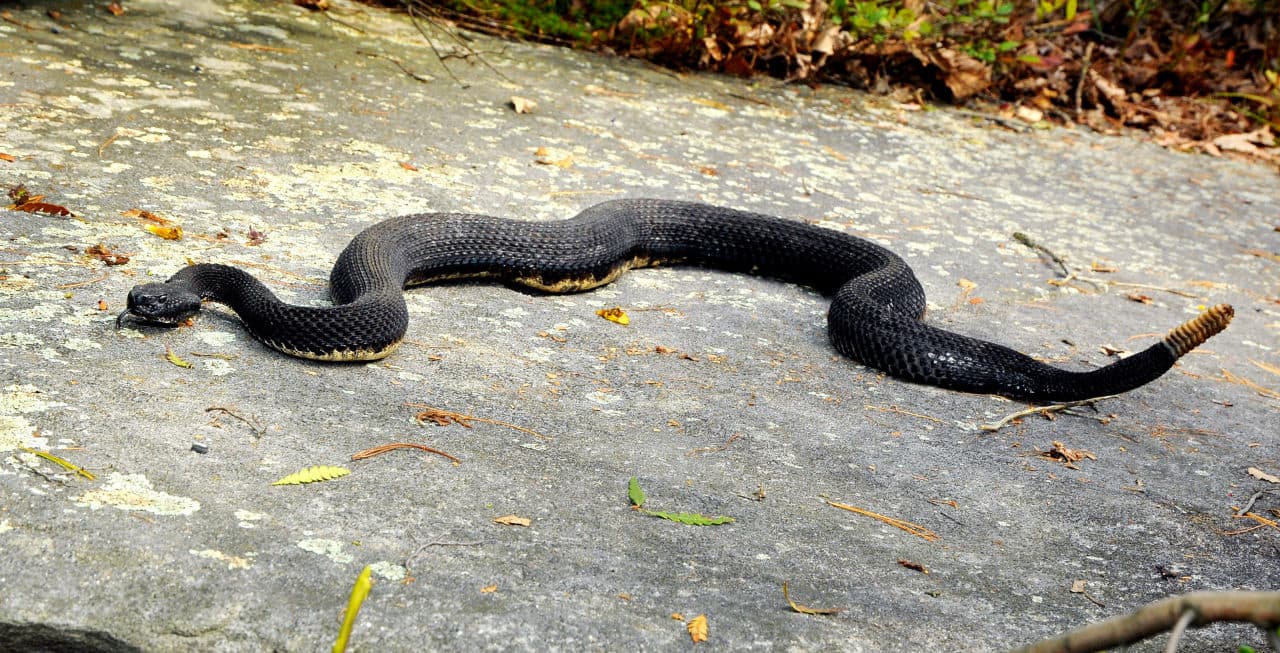Advertisement
How The Plan To Populate An Island With Snakes Has Become An Election-Year Wedge Issue
Resume
State officials are apologizing for the way they've handled a plan to use an island in the Quabbin Reservoir in central Massachusetts as a breeding ground for endangered timber rattlesnakes. They say they are now looking at alternatives.
A legislative hearing held near the reservoir in Athol Tuesday brought out some strong opposition and showed what a major political issue rattlesnakes have become in that part of the state.
Turning The Tables
First came the apologies, beginning with Secretary of Energy and Environmental Affairs Matthew Beaton.
"I am sincerely sorry," Beaton said. "In our quest to restore an endangered species, we failed to collaborate with some of our closest allies and for that I apologize."
Then came Commissioner George Peterson of the Department of Fish and Game.
"We blew this terribly, absolutely terribly," he said.
Apologies to the public, apologies to the communities which will be the snakes’ neighbors, however remote, and most especially, apologies to lawmakers, who complained of being blindsided by the roll out of "Rattlesnake Island," which has generated lots of constituent calls and complaints.
State Sen. Anne Gobi said that’s why she called the oversight hearings.
"Basically because we weren’t getting the answers," she said. "The first few hearings that were held, they were held by the Division of Fisheries and Wildlife. It wasn’t an opportunity for the entire members of the Legislature to be able to ask those questions."
Now the tables were turned and the legislators could ask questions. The next four hours covered the mating habits, motion, range, reproductive life, swimming abilities, danger, population decline and even the supply of anti-venom at area hospitals for those who might be bitten even though the odds are called "astronomically small."
"This is a controversial issue," Athol Selectman Anthony Brighenti said. "Nobody went to the coffee shops, to the barber shops, to the hair styling salons to ask what the real people wanted."
So Few Snakes, So Many Grievances
Brighenti called up the memory of how the Quabbin came to be, when the legislative powers of Greater Boston chose to evict the citizens of four towns and flood them out to create its own supply of drinking water.
Sharing anger in the mistrust about what they see as experiments and bureaucratic certainty, opponents of the rattlesnake colony view the project as a classic case of big government imposing venomous snakes on a small community.
"The one word all over this plan is stupid," said local resident Matt Alden. "Because these are a poisonous snake that serve no purpose for being here, number one."

The designated refuge, Mount Zion, is an island with an asterisk -- since it has a causeway to the mainland. It is already off-limits to the public.
State biologist Thomas French, the director of the rattlesnake project, says the science is solid.
"We’re designing it in order to try to keep the snakes in a place where the public won’t bother the snakes," French said. "We don’t want the two to cross, for the rattlesnakes' sake."
But the argument about restoring rattlesnakes seems to rest outside of science and fact.
Martha Knightly, of Ware, insists the issue is safety.
When I mentioned that the probability of being killed by a snake ranks up there with the threat of dying from your pajamas catching fire, Knightly responded: "Well, I know that, but you know something? Sometimes that happens, doesn’t it."
Becoming A Political Issue
The size of the opposition is uncertain, but its intensity isn’t. And in an already odd election year, public opinion could turn "Rattlesnake Island" into a political issue.
On the Joint Committee on the Environment, Natural Resources and Agriculture sit two Democratic senators, both targeted by Republicans who consider them vulnerable. The committee chair, Sen. Anne Gobi, represents a red district and won her last election by 400 votes.
Republican James Ehrhard, who is running against her, says she’s too liberal.
"A vote for Gobi is a vote for rattlesnakes," Ehrhard, who is against the island, said. "It’s been on her watch, her committee oversees the department. It’s as simple as that."
Gobi said she’s not convinced the Quabbin Reservoir island should be home to the rattlesnake colony.
"I’m not confident in this project. I never have been from the beginning," she said.
She said she used the oversight hearings to her advantage by going after the way in which the Baker administration put it forward. And the governor was apologizing through his environmental secretary, Beaton.
"Because we set up this hearing is the reason that the secretary and the governor agreed to form this working group," Gobi said.
That was indeed the upshot of the day: the announcement by Secretary Beaton to form a “public dialogue” and a working group to analyze the merit, location and timeline of the rattlesnake proposal.
"Hopefully once that process is described, and the plan is described more effectively than has been done in the past, that the public then sees the merits," he said.
Such is the expressed hope that science and facts and dialogue will bring consensus — and a new colony of rattlesnakes.
This segment aired on May 11, 2016.
